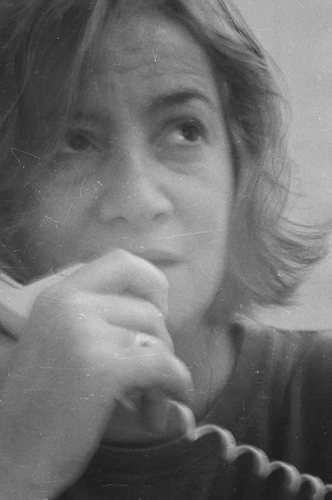Difference between revisions of "Suzanne Poli: a brief history"
| Line 3: | Line 3: | ||
Christopher Street Liberation Day March 1970-85 | Christopher Street Liberation Day March 1970-85 | ||
| + | |||
| + | ---- | ||
==Introduction== | ==Introduction== | ||
| Line 35: | Line 37: | ||
[[Image:Self-Portrait,-Suzanne-Poli,-1980.gif]] | [[Image:Self-Portrait,-Suzanne-Poli,-1980.gif]] | ||
</div> | </div> | ||
| − | |||
---- | ---- | ||
| + | <div style="text-align: left; direction: ltr; margin-left: 1em;"> | ||
| + | == Suzanne Poli: Wikipages == | ||
| Line 46: | Line 49: | ||
# [[Suzanne Poli Photos: 1975-80]] | # [[Suzanne Poli Photos: 1975-80]] | ||
# [[Suzanne Poli Photos: 1981-85]] | # [[Suzanne Poli Photos: 1981-85]] | ||
| + | </div> | ||
| − | |||
---- | ---- | ||
Revision as of 14:22, 6 June 2009
Suzanne Poli Photo Exhibit: a view from my window
Christopher Street Liberation Day March 1970-85
Introduction
Suzanne Poli, A Brooklyn native, moved to an apartment building on Christopher Street on January 19,1967 with her husband and young daughter.
On a night in 1969 she experienced a turbulent night that would become known as The Stonewall Riots. "I heard a noise and a ruckus and all this fighting. I was very much a freedom fighter. When I realized this was because of an injustice going on, I felt my own ideas of equality and justice were being tampered with."
A year later the first Christopher Street Liberation Day March made its debut, and Poli shot the event from her apartment window and except for two or three parades shot most of the parades from 1970-1984.
Poli had many gay friends in the 1960's but says communication and protest were very different and much scarier in the earlier days of what is now known as the Heritage of Pride Parade. "When I talked to my gay friends back then, there was an austere quiet. There was a hush but also an excitement because we knew it was the beginning of something important."
In those earlier days the marchers were not gay and lesbians, she says, but rather groups of feminists,socialists and students. It was too dangerous for most LGBT people participate.
So the photos in this online exhibit not only show the many brave LGBT marchers who were shunned by the city, the police and local businesses but the allies who fought along side them. Another reason to display these images is to show future generations the difficulties of those earlier years.
Poli states: "Through my images, I hope to create change, to get people thinking. I was to give them hope and optimism. I want them to know that if you stay with it, you will ge there."
Suzanne Poli: Self Portrait (1980)
Suzanne Poli: Wikipages
Text by Suzanne and Bruce Poli.
Photos copyright © Suzanne Poli 1970-85. All Rights Reserved.
No photos can be reproduced or use without written permission.
